
K-12
Op-Ed
How Can Educators Help Students Overcome Learning Loss?
By Victoria Berman
November 23, 2021
The concept of learning loss has always been an issue that both teachers and students of all ages deal with. However, due to the current circumstances, learning loss has become an even greater problem, significantly affecting students’ knowledge retention and stunting their progress.
Some of the most notable factors which decrease engagement levels and negatively impact learning include impaired school routine, extended breaks, course scheduling, and ineffective teaching.
In order to avoid further worsening of these causes, it is crucial that the education system takes agile approaches to overcome learning loss. These approaches shouldn’t be a quick fix, but instead long-term and sustainable solutions that can benefit everyone, especially students.
From identifying the learning gaps to implementing tutoring, this study guide to overcoming learning loss offers five strategies every educator can use to help their students.
Identify learning gaps
Before you start making changes and improving students’ learning capabilities, it is important that educators identify their learning gaps. This refers to what the students are expected to learn by a certain grade level as opposed to what they have actually learned up to that point.
The learning gaps usually occur when a student is unable to master concepts at the foundation level, so they continue to struggle as new ones are taught on top of the previous ones. That’s why addressing these educational gaps early on is very important in order to help students not fall behind with their learning.
Emphasize content that is a prerequisite for future learning
Another effective strategy to overcome learning loss is to emphasize content that is a prerequisite for future learning. This means focusing on mastering skills that are essential for being academically successful in a particular subject area in the future.
For example, learning multiplication skills are crucial for learning long division later on. Or writing a high-quality essay first requires mastering how to write a draft, do research, and understand basic punctuation.
One helpful way of addressing missed learning standards and content is by including longer blocks for such subjects while shortening other periods such as study halls or social studies.
Promote project-based learning
Project based learning can also help alleviate learning loss in students. Depending on the subject, these projects can last anywhere from one week to a semester and offer plenty of benefits to students that range from acquiring good problem-solving and critical thinking skills to boosting self-confidence.
Whether the student is working alone or in groups, they will be able to develop a deeper understanding of the learning content and demonstrate their ability to apply desired skills that improve their engagement levels as well as their collaboration and communication capabilities with fellow peers.
Focus on personalization
It is no secret that all students learn at different rates, so using standardized lessons that focus on the entire class can certainly contribute to increased learning loss.
One way of dealing with this problem is for educators to try and adapt their lessons for each of their students. This typically includes constructing personalized lesson plans and employing different teaching methods that accommodate every student.
For example, collaborating and creating a profile of the student’s strengths and weaknesses, conducting baseline assessments, and intervening after each one is some effective teaching methods that focus on personalization.
Consider offering tutoring lessons
Tutoring lessons, whether virtual, hybrid or face-to-face, can also help in overcoming learning loss. These can be regarded as extra-time interventions during which students will receive that extra support from a content-strong teacher and make up for lost learning.
For example, math is one of the most challenging subjects for students. Therefore, a math teacher can offer additional lessons which focus on troubling content material and provide the learner with a unique and individualized learning experience. This will further help the student improve their overall academic performance, retention, and even personal growth.
Final thoughts
No matter how hard teachers and education staff members are trying, learning loss will most likely be a big issue for many students. Fortunately, there are lots of effective ways of how this can be mitigated and help students of all ages overcome their learning disabilities and perform better academically. Choosing the right strategy will mostly be based on the educator’s capabilities as well as the students’ needs and preferences.
Featured Image: CDC, Unsplash.









Nice and informative blog post. Was looking for some important information and visited your this page having crucial and knowledgeable content. Really written well. Share more alike this. Thank you and keep posting.